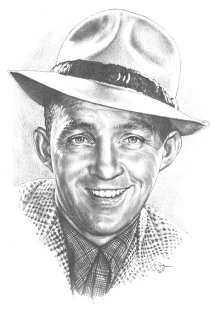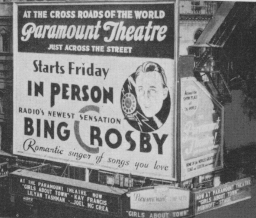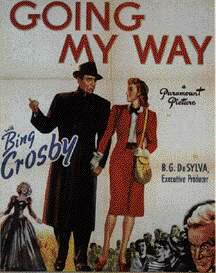Going His Way Is a Nation's Habit
After Twenty Years of Crosby Song
 Newsweek, January 26, 1946, p66.
Newsweek, January 26, 1946, p66.
"Don't worry about Bing," Bob Hope prophesied. "He is the man who made Sinatra's mother swoon. And, in 1960, he'll be the man who will make Sinatra's daughter swoon." Never one to knock down a friend's gag, in a year when The Voice seemed secure in a triumphant reign of adolescent hysteria, Crosby proceeded to run up these 1945 addenda to an already incredible record:
- He knocked off the astonishing total of $400,000 in record royalties.
- He won Yank magazine's GI poll as the person who had done most for the morale of overseas servicemen.
- He was named by newspaper radio editors, in polls by both Motion Picture Daily-Fame and radio Daily, as the nation's No. 1 male vocalist -- although he was on the air only about five months of the twelve.
- He ambled up to receive an Oscar for "Going My Way" (1944).
- He was named by the country's movie exhibitors as top money-making star -- a first he also won in 1944.
For these chores alone, Crosby easily made more than $1 million -- and that's ignoring the income from Crosby-owned real estate, investments and securities, or the Bing Crosby Productions, Inc., producers of "The Great John L." That was last year. With record production stepping into high gear, "The Bells of St. Mary's" just released, the Crosby-Hope "Road to Utopia" due in March, and any number of new radio programs ready and waiting when and if the Kraft Music Hall suit is settled (Newsweek, Jan. 14), 1946 promises bigger and better Bingo.
Man and voice, Bing Crosby is unique. If the boy from Tacoma and Spokane, Wash., is not the singer heard most all over the world, then let the challenger prove his claim. Some 75 million Crosby records have spun round and round at home, on the air, and in the jukebox. Add to that the uncountable millions who have heard his quivering tonsils on the air or in the movie house.
In spite of it all, Bing is still the guy who called himself The Groaner and who used to say: "Baloney. I'm just another baritone with a gravel throat." This is not a post -- or people would have believed him long before now, for he has been in the music and entertainment business for at least 20 years. Although at 41 (or is it 44?) the Crosby dome is balder and the Crosby face a little thinner and more lined, the Crosby voice is at its peak and the Crosby charm was never used to better advantage.
Personally, Bing is the man nobody knows but who is everybody's best friend. He can deliver the best brush in all Hollywood or Tin Pan Alley. Trying to get him when he is not in the mood, which is almost always, is like beating your head against an air mattress. He has often said that with the record, movie and radio mediums at his disposal he needs publicity about as much as he needs a hole in his head. All he feels he owes his public is his best performance -- not a look into his bedroom.
Nor is the investor advised to by much stock in that legend about Crosby the Casual Character who doesn't like to work. He just knows how to relax, a trait not commonly noticed in singers and actors. What they call temperament, he probably thinks is a waste of energy and time. When he doesn't like something planned for him, he often just doesn't show. Ordinarily, his movie make-up problems are as simple as gluing on his toupee. But let a scene arise which he doesn't think suited to him, and Crosby somehow never gets his make-up on right.
What prompts him to wear a mixture of hunting attire and Hawaiian beach-wear is undetermined. Some say it's because he's color blind; others claim he is making mock of Hollywood. In any event, his sartorial informality has eased the tension in many recording session and radio broadcasts. His clothes are now a trademark, become to him alone.
The Crosby brand of banter developed early out of a dislike for clichés. "Let's wow 'em" was never for him. "Crumple the folks" is the Crosby style.
 SONG AS IN SHOWER: Around 1932 when Bing struck it big with twenty weeks at the New York Paramount and a starring role in "The Big Broadcast," he brought three members of the Crosby clan in to form Bing Crosby, Ltd. Brother Everett is business manager, Brother Larry is public-relations head and Pop is general liaison. Mother Kate reigns supreme as general watchdog and constant reminder of the family's Roman Catholic conscience. But anybody who doesn't think Bing is still making his own big decisions has been playing the market again on the Casual Character.
SONG AS IN SHOWER: Around 1932 when Bing struck it big with twenty weeks at the New York Paramount and a starring role in "The Big Broadcast," he brought three members of the Crosby clan in to form Bing Crosby, Ltd. Brother Everett is business manager, Brother Larry is public-relations head and Pop is general liaison. Mother Kate reigns supreme as general watchdog and constant reminder of the family's Roman Catholic conscience. But anybody who doesn't think Bing is still making his own big decisions has been playing the market again on the Casual Character.
Musically, Bing is just as extraordinary. His ear and memory for music almost unbelievable; his rhythm, phrasing and pitch beyond reproach. He has an easy two-octave reach but seldom uses it as people who like to sing his songs couldn't if he did. "Bing sings," said Dinah Shore, "like all people think they sing in a shower." He can sing everything -- and to everybody's taste -- from the "Ave Maria" to "Your Socks Don't Match."
Composers say he always sings their songs the way they intended them to be sung -- and often at first sight. This facility once prompted John Scott Trotter, the Kraft Music Hall maestro, to warn a colleague: "Only play it once ... He hears so quickly that the second time through he starts improvising."
Nor has Crosby ever forgotten that singing is his business. Where other men, in the careless rapture of movie stardom, might have wanted to play Romeo, he balks at any role out of character. And as for living or dying over the next gag, he can't see it. "I'm not a comedian," he says, "I'm a musician."
Staying on top in a business where radio and the movies can turn yesterday's star into today's has-been is not simple. To see that Crosby stays safely ahead of the Sinatras, the Perry Comos, and the Joe Gargles of tomorrow, he and a trusted circle of advisers devote much time, thought, and energy toward two steady music mediums: the songs he puts on records, and the songs he sings in movies.
FLYING DOWN TO DECCA: Bing makes records as you eat steak -- with relish, and no apparent effort. For proof, join Newsweek in a three-hour Crosby-Eddie Condon session in Decca Studio A in New York:
It was Jan. 15. The old studio clock had just struck 3 p.m. Condon's barefoot-boys-with-shoes-on were on hand but showing visible signs of strain at the early hour. Decca types hustled -- keeping a sharp eye on the door. At about 3:15 the Crosby arrived. Stripped of his bright yellow scarf, tweed coat, and inner-lined battle jacket, he was left naked in a brown felt hat, bright red checked shirt, brown slacks, and the sort of shoe ordinarily seen in the Alps at this time of year. Came 3:45, and in rushes Condon. No taxis, he said.
"Blue and Broken Hearted," the first number to be waxed, didn't go so well. A large, blue screen-like sound absorber stood between Bing and the boys. Kicking it aside, he commented: "Got to see if anybody's alive out there." Another run-through or two and, at his question: "Will this be the deathless disk? Shall we, men?" the side joined history.
"After You've Gone" went rather quickly. Although trouble loomed when Jack Kapp, president of Decca and Crosby adviser-extraordinary on record policy, walked in and asked if "Wild Bill" Davison's trumpet ought to stay so dirty. "You go back to the board of directors if you make one more remark," Crosby said. "I've flown these boys in at great expense. Eddie flew in without a plane."
The clock was falling away from 5 when the group assailed "Personality," a sock potential from "Road to Utopia." Since Dorothy Lamour sings it in the picture, Bing had never seen the music. But no matter. He smoked his pipe ("the kinda singing I do, you can't hurt your voice"), achieved one of his rare grimaces at what he called Newsweek's "nostril shots" (see cover), and the side was done. Exit the Crosby -- fast.
When Kapp signed Crosby, he was determined to make him the most versatile singer the business had ever known. As a result, there are Crosby Hawaiian songs, cowboy songs, Irish songs, operettas, ballads, patriotic items, hymns, and hot jazz. Some of them he had to be coaxed into doing, and for others led by the nose.
When Kapp wanted him to record "Silent Night," for example, he said it was a song strictly for Lily the Pons. Persuaded only after he had heard himself and had demanded that all royalties from it go into a charitable fund, he had watched it sell 1.8 million copies and become No. 2 on his all-time best-seller list. White Christmas with a 2.5 million sale, is No. 1, and Sweet Leilani, of all things, is No. 3.
 TWINS BEHIND BING: Back of the songs Bing sings are Johnny Burke and Jimmy Van Heusen, Crosby's Gold Dust Twins. If they had written no other songs for Bing than those in "Going My Way," that alone would justify their place in the Inner Circle. The album has sold more than 750,000 copies; Swinging on a Star won the Academy award, and hardly a week passes that some priest or parson doesn't ask permission to use the lyrics in a sermon or a religious article or book.
TWINS BEHIND BING: Back of the songs Bing sings are Johnny Burke and Jimmy Van Heusen, Crosby's Gold Dust Twins. If they had written no other songs for Bing than those in "Going My Way," that alone would justify their place in the Inner Circle. The album has sold more than 750,000 copies; Swinging on a Star won the Academy award, and hardly a week passes that some priest or parson doesn't ask permission to use the lyrics in a sermon or a religious article or book.
The Gold Dust Twins, however, have also knocked off such hard-to-handle problems as the Roads to Zanzibar and Morocco, the current "Bells of St. Mary's," and the forthcoming "Road to Utopia." At one time recently, they were working on five pictures at once, including J. Arthur Rank's "London Town," which is now being filmed in England. That period, they say, brought on their first nervous breakdown. Last week, as they were putting the final touches to their new Broadway show "Nellie Bly," they were in the middle of a second collapse.
Burke, an ASCAP AA (top-classification) lyricist, entered the Crosby career in 1936. Bing liked Burke's words to "Annie Doesn't Live Here Any More," and arranged for him to do "Pennies from Heaven." Van Heusen joined up in 1940 having already collaborated with Burke on "Imagination" and the Benny-Allen picture, "Love Thy Neighbor."
Although Crosby has never turned down a Burke and Van Heusen ditty, Burke admits that it is not always easy to keep the lyrics keyed to the Crosby style. Moonlight Becomes You and A Pocketful of Dreams as phrases were both directly inspired by Der Bingle's easy talk. To show how delicate a problem Swinging on a Star was, fancy yourself being told by Hollywood to write the Ten Commandments in jazz. Baffled, Van Heusen simply titled his melody "The Way of the Transgressor."
Burke is 37, Van Heusen 32. Both, like Crosby, are losing their hair. Both, like Crosby, are elusive. Van Heusen's real name is Edward Chester Babcock, but he chose his professional name as a 14-year-old in Syracuse, N.Y., in order to avoid his father's ire when he sang on the local radio. Any resemblance to the collar ad was purely on purpose. During the war he was a test pilot for Lockheed, alternating melody with roaring P-38s. While Van Heusen always appears to view life a trifle gloomily. Burke is the cheery type. A family man, he has a son and twin daughters -- "the things you have to do to keep up with Crosby," he says.
Although the Twins are so closely identified with Crosby, they have, as they put it, "a nonexclusive contract with nobody." But if asked whether Crosby has first call on their talents, they are the first to admit: "Sure, wouldn't you?" A wistful tone enters their collective voice, however, when they discuss their public. "A Mercer song is always by Mercer," they say. "And a Rodgers and Hammerstein song is always by Rodgers and Hammerstein. but a Burke and Van Heusen song is always a Crosby song."
SONGS FOR SALE: Since more money is to be had if you not only write a song but also publish it, Burke and Van Heusen went into Tin Pan Alley for themselves on the strength of the songs from "Going My Way." Burke and Van Heusen, Inc., is owned five ways: by the Twins, Crosby, Sidney Kornheiser, who handles the professional end, and Edwin H. (Buddy) Morris, who also has a firm of his own in which Bing owns stock.
In addition to these two firms, Crosby also owns part of two others, the income from all four being placed in trust for his four sons -- Gary, the twins Dennis and Philip, and Lindsay. Bing calls them "The Irishers."
The reason for investing in sheet-music publishing may not be readily apparent to the nonprofessional, but when a guy writes a song one night and thousands of people rush out and buy it the next day, not to invest is bad business. Conversely, it is good business for Bing to plug songs he sings in pictures, especially since his own firms handle them.
In Crosby's case, however, the plugging is not carried to the extremes now followed by some bandleader-publishers. Bing always sings what the public likes. "I entertain people," he says, "so why should I force 'em to listen to some song that I like? I aim to please." Offhand, one would say he does.
 SONG AS IN SHOWER: Around 1932 when Bing struck it big with twenty weeks at the New York Paramount and a starring role in "The Big Broadcast," he brought three members of the Crosby clan in to form Bing Crosby, Ltd. Brother Everett is business manager, Brother Larry is public-relations head and Pop is general liaison. Mother Kate reigns supreme as general watchdog and constant reminder of the family's Roman Catholic conscience. But anybody who doesn't think Bing is still making his own big decisions has been playing the market again on the Casual Character.
SONG AS IN SHOWER: Around 1932 when Bing struck it big with twenty weeks at the New York Paramount and a starring role in "The Big Broadcast," he brought three members of the Crosby clan in to form Bing Crosby, Ltd. Brother Everett is business manager, Brother Larry is public-relations head and Pop is general liaison. Mother Kate reigns supreme as general watchdog and constant reminder of the family's Roman Catholic conscience. But anybody who doesn't think Bing is still making his own big decisions has been playing the market again on the Casual Character.
 Newsweek, January 26, 1946, p66.
Newsweek, January 26, 1946, p66.
 TWINS BEHIND BING: Back of the songs Bing sings are Johnny Burke and Jimmy Van Heusen, Crosby's Gold Dust Twins. If they had written no other songs for Bing than those in "Going My Way," that alone would justify their place in the Inner Circle. The album has sold more than 750,000 copies;
TWINS BEHIND BING: Back of the songs Bing sings are Johnny Burke and Jimmy Van Heusen, Crosby's Gold Dust Twins. If they had written no other songs for Bing than those in "Going My Way," that alone would justify their place in the Inner Circle. The album has sold more than 750,000 copies;